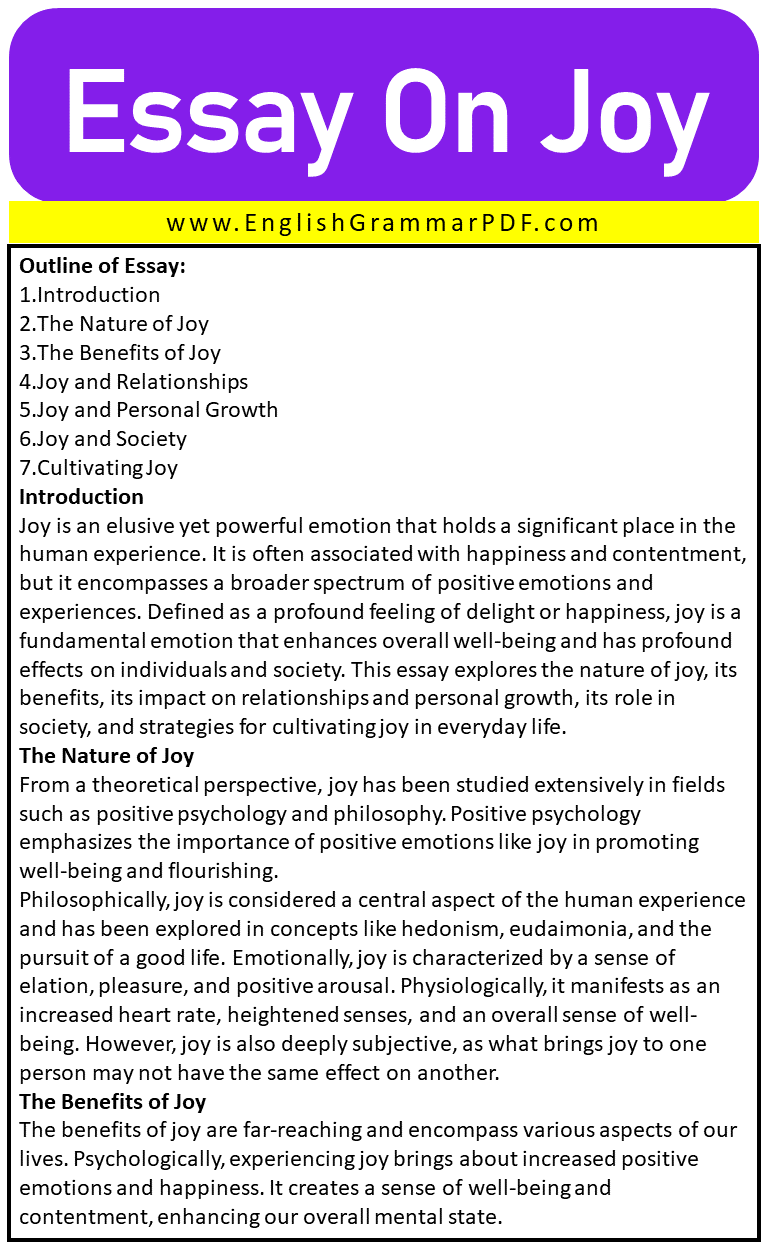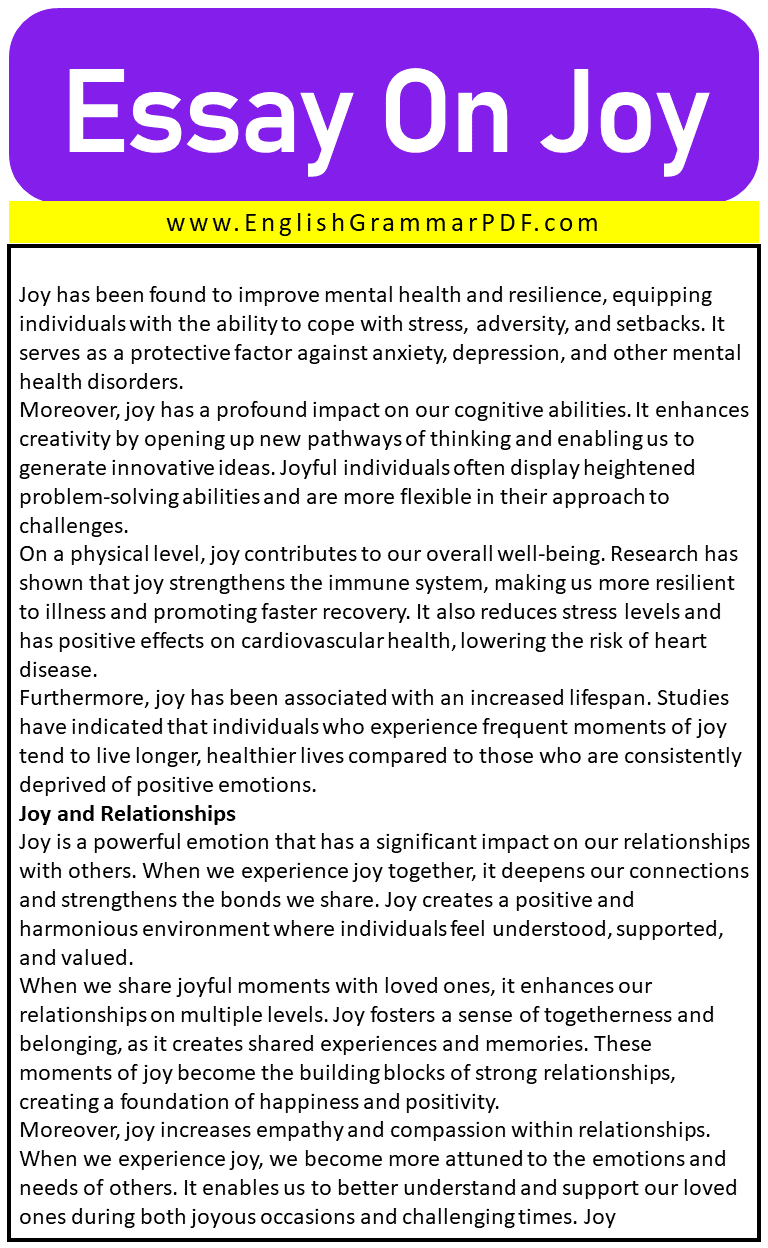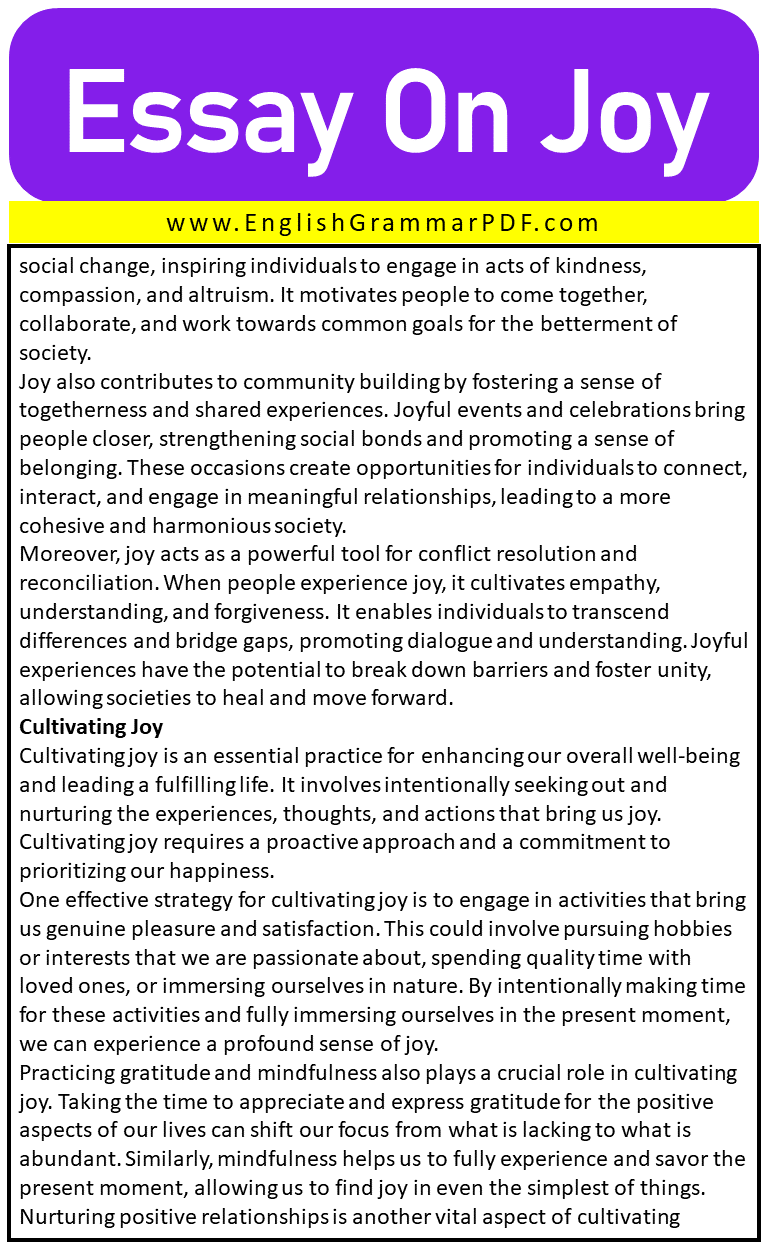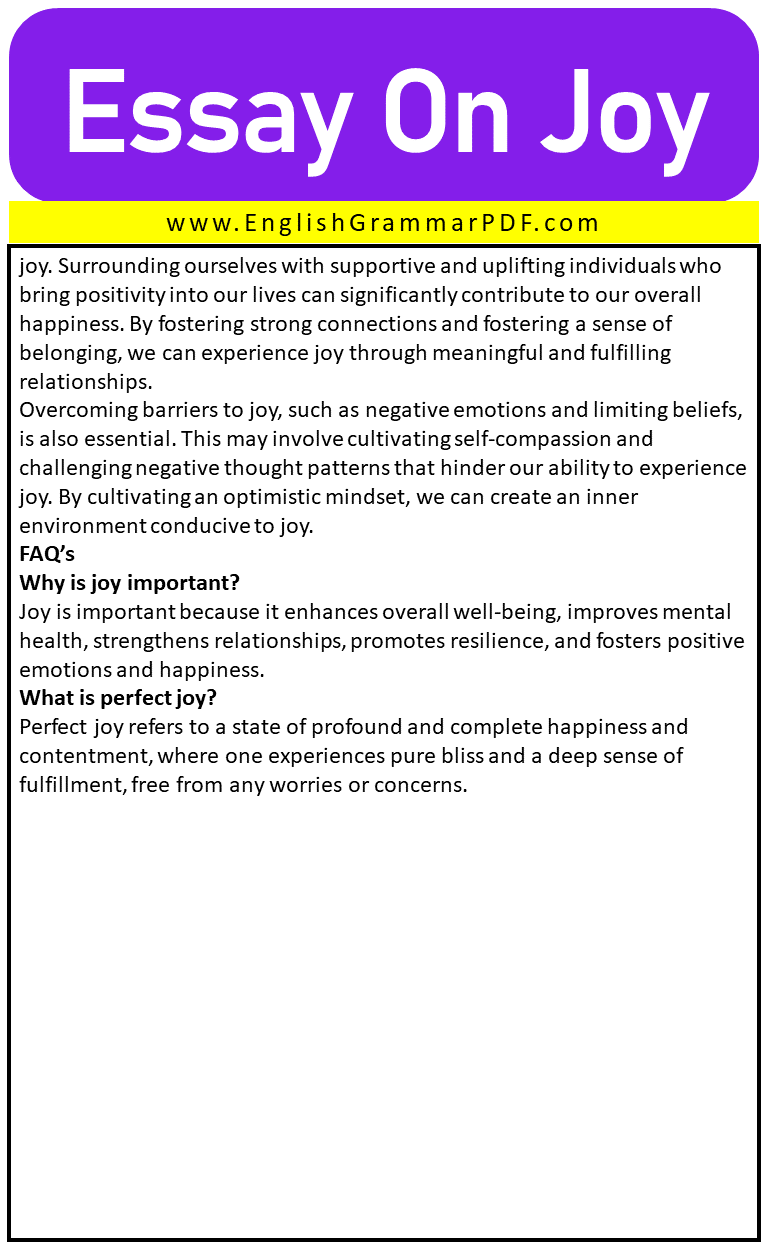Essay On Joy
Outline of Essay:
- Introduction
- The Nature of Joy
- The Benefits of Joy
- Joy and Relationships
- Joy and Personal Growth
- Joy and Society
- Cultivating Joy
Introduction
Joy is an elusive yet powerful emotion that holds a significant place in the human experience. It is often associated with happiness and contentment, but it encompasses a broader spectrum of positive emotions and experiences. Defined as a profound feeling of delight or happiness, joy is a fundamental emotion that enhances overall well-being and has profound effects on individuals and society. This essay explores the nature of joy, its benefits, its impact on relationships and personal growth, its role in society, and strategies for cultivating joy in everyday life.
The Nature of Joy
From a theoretical perspective, joy has been studied extensively in fields such as positive psychology and philosophy. Positive psychology emphasizes the importance of positive emotions like joy in promoting well-being and flourishing.
Philosophically, joy is considered a central aspect of the human experience and has been explored in concepts like hedonism, eudaimonia, and the pursuit of a good life. Emotionally, joy is characterized by a sense of elation, pleasure, and positive arousal. Physiologically, it manifests as an increased heart rate, heightened senses, and an overall sense of well-being. However, joy is also deeply subjective, as what brings joy to one person may not have the same effect on another.
The Benefits of Joy
The benefits of joy are far-reaching and encompass various aspects of our lives. Psychologically, experiencing joy brings about increased positive emotions and happiness. It creates a sense of well-being and contentment, enhancing our overall mental state.
Joy has been found to improve mental health and resilience, equipping individuals with the ability to cope with stress, adversity, and setbacks. It serves as a protective factor against anxiety, depression, and other mental health disorders.
Moreover, joy has a profound impact on our cognitive abilities. It enhances creativity by opening up new pathways of thinking and enabling us to generate innovative ideas. Joyful individuals often display heightened problem-solving abilities and are more flexible in their approach to challenges.
On a physical level, joy contributes to our overall well-being. Research has shown that joy strengthens the immune system, making us more resilient to illness and promoting faster recovery. It also reduces stress levels and has positive effects on cardiovascular health, lowering the risk of heart disease.
Furthermore, joy has been associated with an increased lifespan. Studies have indicated that individuals who experience frequent moments of joy tend to live longer, healthier lives compared to those who are consistently deprived of positive emotions.
Joy and Relationships
Joy is a powerful emotion that has a significant impact on our relationships with others. When we experience joy together, it deepens our connections and strengthens the bonds we share. Joy creates a positive and harmonious environment where individuals feel understood, supported, and valued.
When we share joyful moments with loved ones, it enhances our relationships on multiple levels. Joy fosters a sense of togetherness and belonging, as it creates shared experiences and memories. These moments of joy become the building blocks of strong relationships, creating a foundation of happiness and positivity.
Moreover, joy increases empathy and compassion within relationships. When we experience joy, we become more attuned to the emotions and needs of others. It enables us to better understand and support our loved ones during both joyous occasions and challenging times. Joy enhances communication and conflict resolution as well, as it promotes open and positive dialogue, making it easier to navigate through disagreements and find resolutions.
In romantic relationships, joy plays a crucial role in creating and maintaining intimacy. The shared joy between partners strengthens the emotional connection and deepens the bond they share. Joy also adds excitement and passion to the relationship, making it more fulfilling and vibrant.
Joy and Personal Growth
Joy serves as a catalyst for personal growth, fostering resilience, and optimism within individuals. When we experience joy, it uplifts our spirits and provides us with a positive outlook on life. This optimism and emotional well-being enable us to navigate through challenges and setbacks more effectively. Joy helps us develop resilience by instilling in us the belief that we have the strength and ability to overcome obstacles and persevere.
Moreover, joy is intricately linked to personal fulfillment. When we experience joy, whether through pursuing meaningful goals, engaging in activities we love, or cultivating gratitude and mindfulness, we tap into our true passions and desires. Joy ignites a sense of purpose within us, inspiring us to lead lives that align with our values and aspirations. It encourages us to seek out experiences and opportunities that bring us joy and fulfillment, ultimately leading to personal growth and self-actualization.
By cultivating joy, we unlock our potential and open ourselves up to new possibilities. It encourages us to step out of our comfort zones, embrace change, and take risks. Joy fuels our curiosity and creativity, allowing us to explore and develop new talents and skills. It empowers us to embrace growth and continuously evolve as individuals.
Joy and Society
Joy plays a significant role in shaping society and has far-reaching effects on the collective well-being of communities. When individuals experience joy, it has a ripple effect, spreading positivity and creating an atmosphere of happiness and contentment. Joy serves as a driving force for social change, inspiring individuals to engage in acts of kindness, compassion, and altruism. It motivates people to come together, collaborate, and work towards common goals for the betterment of society.
Joy also contributes to community building by fostering a sense of togetherness and shared experiences. Joyful events and celebrations bring people closer, strengthening social bonds and promoting a sense of belonging. These occasions create opportunities for individuals to connect, interact, and engage in meaningful relationships, leading to a more cohesive and harmonious society.
Moreover, joy acts as a powerful tool for conflict resolution and reconciliation. When people experience joy, it cultivates empathy, understanding, and forgiveness. It enables individuals to transcend differences and bridge gaps, promoting dialogue and understanding. Joyful experiences have the potential to break down barriers and foster unity, allowing societies to heal and move forward.
Cultivating Joy
Cultivating joy is an essential practice for enhancing our overall well-being and leading a fulfilling life. It involves intentionally seeking out and nurturing the experiences, thoughts, and actions that bring us joy. Cultivating joy requires a proactive approach and a commitment to prioritizing our happiness.
One effective strategy for cultivating joy is to engage in activities that bring us genuine pleasure and satisfaction. This could involve pursuing hobbies or interests that we are passionate about, spending quality time with loved ones, or immersing ourselves in nature. By intentionally making time for these activities and fully immersing ourselves in the present moment, we can experience a profound sense of joy.
Practicing gratitude and mindfulness also plays a crucial role in cultivating joy. Taking the time to appreciate and express gratitude for the positive aspects of our lives can shift our focus from what is lacking to what is abundant. Similarly, mindfulness helps us to fully experience and savor the present moment, allowing us to find joy in even the simplest of things.
Nurturing positive relationships is another vital aspect of cultivating joy. Surrounding ourselves with supportive and uplifting individuals who bring positivity into our lives can significantly contribute to our overall happiness. By fostering strong connections and fostering a sense of belonging, we can experience joy through meaningful and fulfilling relationships.
Overcoming barriers to joy, such as negative emotions and limiting beliefs, is also essential. This may involve cultivating self-compassion and challenging negative thought patterns that hinder our ability to experience joy. By cultivating an optimistic mindset, we can create an inner environment conducive to joy.
FAQ’s
Why is joy important?
Joy is important because it enhances overall well-being, improves mental health, strengthens relationships, promotes resilience, and fosters positive emotions and happiness.
What is perfect joy?
Perfect joy refers to a state of profound and complete happiness and contentment, where one experiences pure bliss and a deep sense of fulfillment, free from any worries or concerns.
Explore More Essays:
Download the PDF of the Essay:








